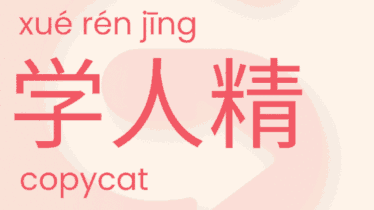English words from Chinese origin
Maybe you’ve noticed Chinese words that have an English origin, such as 沙发Shāfā (sofa) or 巧克力Qiǎokèlì (chocolate), but the opposite is also true. There are many English words of Chinese origin. Here we go over a few. These words are called cognates or loan words, and they’re very common among languages. Most of the time, they describe things exclusive to China or Asia, and the English language wouldn’t have had a word for it already.
Just one big disclaimer. If we take, for instance, the word typhoon: we know that the English and Chinese words to describe such a storm sound very similar: Typhoon & 台风Táifēng. Yet based on linguistic research, it’s not as simple as saying this name for sure comes from Chinese — it could have also come into English from dialects such as Minnanhua or Cantonese, or even Japanese. These languages come from the same region and it’s hard to pinpoint exactly who contributed this cognate. In the case of typhoon, it could have even come from the Greek word ‘typhon’, which is a monster with a tremendous voice in ancient Greek mythology.
‘Typhoon’ was first used in a southern dialect in China, which only means ‘big powerful wind’. Then it became used in Mandarin to describe this kind of ‘large storms with high winds that come off Pacific ocean’, while the one that comes from the Atlantic ocean is called a ‘飓风’ (jùfēng) in Chinese, which is ‘hurricane’ in English.
While it’s hard to say for sure, here are more English words that probably originate from the Chinese language.
Food-related English words from Chinese
- Tofu (豆腐 Dòufu)
- Kung pao chicken (宫保鸡丁Gōng bǎo jī dīng)
- Lychee (荔枝 Lìzhī)
- Won ton (馄饨 húntún)
- Chowmein (炒面 chǎomiàn
- Bok choy (白菜Báicài)
- Ketchup (茄汁Qié zhī)
- Dim sum (点心Diǎnxīn)
Names for sports from Chinese
- Kong fu (功夫 gōng fū)
- Tai chi (太极拳 tài jí quán, or shadow boxing)
- Ping pong (乒乓球Pīngpāng qiú)
Culture
- Yin & yang (阴阳 yīn yáng)
Clothing
- Qipao (旗袍 qí páo)
- Hanfu (汉服hànfú)
Animals
- Shar Pei (沙皮 shāpí, or sandy skin)
- Shih Tzu (西施犬, xī shī quǎn)
And last: the name China also originates from Mandarin: originating from 秦Qín, the first dynasty that united China.
Plus some English phrases are directly translated from Chinese:
- Long time no see (好久不见Hǎojiǔ bùjiàn)
- No can do (不能做 bù néng zùo)
- Lose face (丢脸 diūlián)



